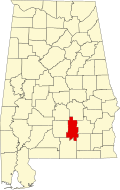Moodys Crossroads, Alabama | |
|---|---|
| Coordinates: 31°44′06″N86°23′41″W / 31.73500°N 86.39472°W | |
| Country | United States |
| State | Alabama |
| County | Crenshaw |
| Elevation | 358 ft (109 m) |
| Time zone | UTC-6 (Central (CST)) |
| • Summer (DST) | UTC-5 (CDT) |
| Area code | 334 |
| GNIS feature ID | 122976 [1] |
Moodys Crossroads is an unincorporated community in Crenshaw County, Alabama, United States. [1] [2] [3]
In 1924, it was a formal location for voter registration; [4] by 1926, it had a cemetery, [5] and a general store was mentioned in 1932. [6] In 2004, it was still referred to as an inhabited settlement. [7]


